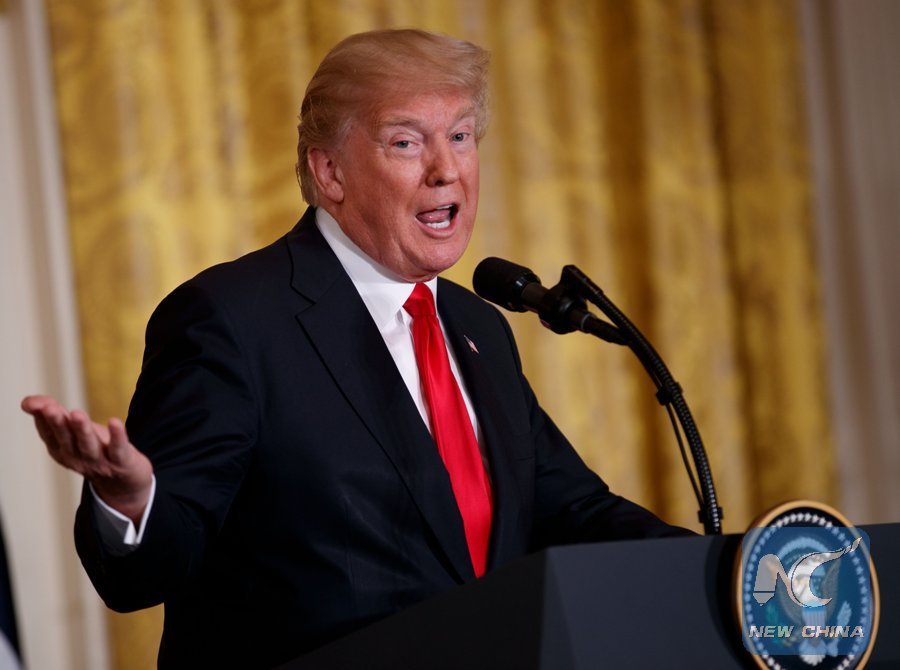
U.S. President Donald Trump speaks during a joint press conference with Norwegian Prime Minister Erna Solberg (not seen) at the White House in Washington D.C., the United States, on Jan. 10, 2018. (Xinhua/Ting Shen)
WASHINGTON, Jan. 18 (Xinhua) -- Both highlighted and defined by the "America First" slogan that bears a protectionist trait, U.S. President Donald Trump's foreign policy has seen a bumpy year for his country and the world, and there are signs that the trend will continue into 2018.
Trump's signature foreign policies in the past year, as listed by the Council on Foreign Relations -- a U.S. think tank headquartered in New York -- include the travel ban on citizens of seven Muslim-majority nations, the retreats from international treaties and organizations, the recognition of Jerusalem as Israel's capital city, as well as the use of profanities in describing nations he denigrates.
"TWIPLOMACY"
During his maiden year in the White House, Trump withdrew the United States from the Paris climate accord, Global Compact on Migration, the United Nations' culture and education body UNESCO, and Trans-Pacific Partnership (TPP), a free trade agreement initially designed to pull together 12 Pacific rim economies. He accused these institutions and treaties of undermining U.S. interests.
Less than one month into the new year, the outspoken president boasted a nuclear button "much bigger" than the one owned by Kim Jong Un, top leader of the Democratic People's Republic of Korea.
Trump later threatened to scrap the 2015 Iran nuclear deal, a hard-won result of a decade of negotiations that is considered by fellow signatories to be the best mechanism available to avoid a nuclear-armed Islamic Republic.
In addition, his decision to suspend military aid to Pakistan ignited fury in a country which otherwise could have been an important partner in the fight against terrorism. Pakistani Foreign Minister Khawaja Asif told the Wall Street Journal after Trump's move that Islamabad's alliance with Washington is over.
Due to Trump's bitter relations with the media -- many of which he has repeatedly denounced as "Fake News" -- Trump prefers to use his personal Twitter account as a channel to announce his policies, including the aforementioned ones that are potentially consequential for America's relations with both its foes and allies.
Trump's addiction to tweeting, coupled with his rather impromptu style of wording, has not only enriched the research pool for scholars interested in the study of so-called "Twiplomacy," but also burdened the president's press secretary with extra explanatory duties. The explanations oftentimes failed to convince the journalists and once even resulted in spokesman Sean Spicer's resignation.
Dan Mahaffee, senior vice president and director of policy at the U.S. Center for the Study of the Presidency and Congress, said Trump's twitter diplomacy is more of a reflection of his "fundamentally transactional approach to foreign policy" than an indication of his "presidential leadership style that is often seen as impetuous and braggadocious."
However, Nile Gardiner, director of the Heritage Foundation's Margaret Thatcher Center for Freedom, argued that "this idea of Twitter diplomacy is a little bit over rated."
"At the end of the day, what is far more important than the tweets that Trump sends is the actual policy," he said.
"I think that there's often a difference between the president's tweets and the actual policies. The tweets are a sort of expression of his immediate sentiment and opinions, but they're not necessarily always the actual policy," the expert added.
"ERRATIC" DIPLOMATIC PERFORMANCE
While acknowledging the certain degree of maturity that President Trump has shown vis-a-vis candidate Trump, Mahaffee noted that the unpredictable nature of U.S foreign policy under the Trump administration had damaged America's global image.
"He has tempered some of the impulses that he displayed on the campaign trail and via tweets from the White House ... (his) brash approach and unpredictability have done much to hurt the American image," Mahafee said.
Darrell West, a senior fellow at the Washington-based think tank Brookings Institution, said the president's diplomatic performance has been "erratic."
"He is easily irritated and prone to rude outbursts in person, on television, and through social media. This concerns leaders in other countries," West said, adding world leaders were wary about the stability of U.S. foreign policy.
Noting Trump's foreign policy priorities are unclear, West said: "There isn't a strong strategic stance behind his various comments and he does not have a deep understanding of foreign policy issues."
Gardiner, however, reckoned that there have not been significant changes in America's image abroad in the past year. He offered an opposite view by saying while Trump might not be "a hugely popular figure," world leaders have understood that "Trump means what he says and delivers his promises."
Although Gardiner admitted in a rather reluctant tone that "you are always going to find anti-Americanism in many parts of the world," what is undeniable during the course of last year is that frustrations brought about by Trump's foreign policies have far outnumbered compliments.
It is feared that the president's unfolding America First vision could veer toward an end that no one wishes to see. Enditem
(Matthew Rusling from Washington contributed to the report.)

